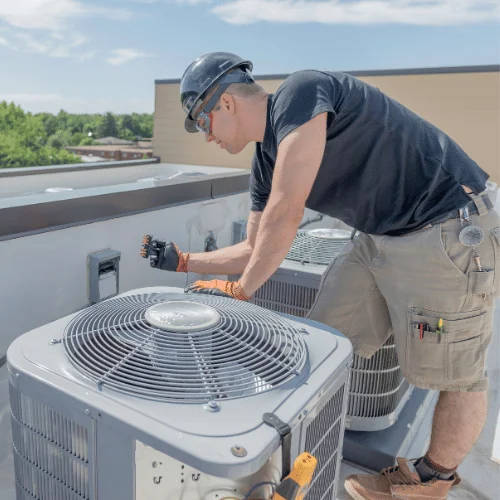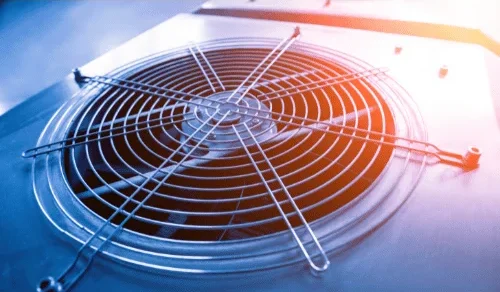The Heating, Ventilation, and Air Conditioning (HVAC) system in your home or commercial space is more than just a convenience. It is an integral part of creating a comfortable and healthy environment. A well-maintained HVAC system enhances indoor air quality, manages humidity levels, and ensures a pleasant temperature year-round. However, all HVAC systems eventually reach their lifespan end, necessitating replacement. Understanding the cost of HVAC replacement is crucial in budgeting for this significant investment.
While the thought of replacing an HVAC system may seem daunting, EnergyHVACService can guide you through the process, making it seamless and less stressful. By working with us, you can receive a transparent, detailed estimate and expert guidance on choosing the most suitable system for your needs.
Overview of HVAC Replacement
An HVAC unit replacement involves more than just substituting an old unit with a new one. It entails a series of activities, beginning with the evaluation of the current system. Professionals examine its age, efficiency, repair history, and operational costs. While most HVAC units last between 15 to 20 years, high repair costs and increased energy bills often signal the need for a replacement.
Regular maintenance, which includes routine inspections and services like HVAC cleaning service, is critical in prolonging the lifespan of your system. It helps prevent unexpected breakdowns and high repair costs, delaying the need for replacement. Professional service providers like EnergyHVACService not only provide 24-hour HVAC service but also preventive maintenance to keep your system functioning optimally.
Factors Influencing the Cost of HVAC Replacement
When it comes to the cost of HVAC replacement, it’s not a one-size-fits-all scenario. A myriad of factors contributes to the overall cost, creating a range that can vary significantly depending on your specific situation. Here, we delve deeper into the main influencers:
- Size and Capacity: The size and capacity of an HVAC system you need are directly correlated with the size of your home or commercial space. A larger capacity system will cool and heat a larger area more effectively. However, it’s important to get a system appropriately sized for your space. A system that’s too large will cost more upfront and could lead to inefficiencies and comfort issues. Conversely, a system that’s too small may struggle to maintain comfort and end up costing more in energy usage. EnergyHVACService professionals can conduct an assessment of your space and calculate the correct system size you need, ensuring efficient operation.
- Energy Efficiency: HVAC units are rated for energy efficiency with a SEER (Seasonal Energy Efficiency Ratio) for air conditioning systems and an AFUE (Annual Fuel Utilization Efficiency) for heating systems. Higher SEER and AFUE ratings indicate a more energy-efficient unit. While these high-efficiency models may have higher upfront costs, they can lead to substantial savings in energy costs over the lifetime of the system. Energy-efficient systems are also environmentally friendlier, reducing your carbon footprint.
- Brand and Quality of Equipment: Like many other products, different brands of HVAC equipment come at different price points. Premium brands may offer high-quality, durable units with advanced features, which are reflected in their cost. Mid-range brands might offer a balance between cost and quality, while budget brands could be more affordable but may not offer the same durability or features. It’s important to choose a reputable brand that fits within your budget while meeting your specific needs.
- Labor Costs: The complexity of the installation impacts the labor costs for HVAC replacement. The process may involve removing the old system, preparing the space for the new system, installing the new unit, connecting it to ductwork and power sources, and ensuring it operates correctly. Some homes or buildings may present unique challenges that could add to the installation time and cost. Furthermore, labor rates can vary based on your geographical location and the experience of the HVAC contractor. EnergyHVACService guarantees skilled professionals who perform efficient and thorough installations at competitive rates.
- Geographic Location: Your location can also affect the cost of HVAC replacement. Prices for both equipment and labor can vary from region to region due to factors like local cost of living, competition among local HVAC contractors, and regional climate. For instance, a home in a hot climate may require a more robust cooling system than one in a milder climate, leading to higher costs.
- Existing Ductwork: If your existing ductwork is in good shape, it can be used with the new HVAC system, significantly saving on the replacement cost. However, if it’s damaged, improperly designed, or not sized correctly for the new system, you may need to account for the cost of replacing HVAC ducts. In some cases, modifications or repairs might be enough, but in others, a complete ductwork replacement may be necessary.
- Additional Installation Challenges: Some homes or buildings may pose unique installation challenges that can add to the replacement cost. For example, if the HVAC unit is hard to access, if the installation involves working around obstacles, or if your home requires additional construction work to accommodate the new system, these complexities can add to the labor time and overall cost.
- Cost of Permits and Inspections: Most HVAC replacements require permits to ensure the work is done according to local codes and regulations. The cost of these permits varies depending on your local jurisdiction. After the installation, an inspection is often necessary to confirm that the system was installed correctly and safely. This, too, incurs a fee, which should be factored into your budget.
Understanding these factors is essential in budgeting for your HVAC replacement cost. While it may seem like a daunting list, remember that professionals like those at EnergyHVACService are here to help. We guide you through the process, providing accurate estimates based on your unique needs and situation, and ensuring a smooth, efficient replacement process.
Notably, it’s crucial to remember that while you may not have control over all these factors, some of them can be managed to your advantage. For instance, choosing the right-sized, energy-efficient unit can result in long-term savings, offsetting the initial higher cost. Similarly, working with a reputable HVAC contractor like EnergyHVACService can ensure that you get the best quality service and expert advice, helping you make informed decisions that can ultimately save you money and provide you with a reliable and efficient HVAC system.

Understanding Types of HVAC Systems and Their Costs
The cost of HVAC replacement depends heavily on the type of system you choose. Central Air Conditioning Systems, common in many homes and small commercial buildings, are moderately priced and offer efficient cooling for your space. Heat Pumps, which can both heat and cool a building, are an excellent choice in milder climates. They offer the convenience of a two-in-one system but can be more expensive to install.
Gas Furnaces are prevalent in areas with colder climates due to their heating efficiency. However, they necessitate a separate cooling system for warmer months. When selecting the best replacement HVAC system, your specific needs and environmental conditions are crucial considerations.
Ductless Mini-Splits have gained popularity due to their efficiency and flexibility. They allow for individual zone control, but their upfront cost can be higher due to the need for multiple indoor units.
Each system type carries different costs, and professional home HVAC services like EnergyHVACService can guide you in determining the most cost-effective solution for your situation.

Potential Additional Costs
Beyond the HVAC system’s upfront cost, additional expenditures can sneak up on you if you’re not prepared. These might include the cost of ductwork repair or replacement if your existing ductwork is not compatible with the new system.
If your electrical system is outdated, there might be costs involved in upgrading it to accommodate the new HVAC system. The removal and disposal of your old system also often incurs a fee, as does the process of obtaining necessary permits and inspections to ensure the new installation complies with local codes and standards.
When planning for the cost of HVAC replacement, it’s crucial to consider these potential additional costs to avoid surprises down the line.
Cost-saving Tips and Financing Options
The cost of HVAC replacement can be substantial, but there are several ways to offset these expenses. One of the simplest ways is to obtain quotes from multiple service providers to ensure you’re getting the most value for your money.
Choosing an energy-efficient model can lead to significant savings on your energy bills, offsetting the higher initial investment over time. Some models might also qualify for rebates or tax credits, further reducing the cost.
If your current system requires frequent costly repairs, replacing it might be more cost-effective.
Flexible financing options and comprehensive warranties from your HVAC provider can further ease the burden of replacement costs.
Conclusion
Navigating the cost of HVAC replacement can seem daunting, but a solid understanding of the involved costs can significantly aid in the decision-making process. A myriad of factors, from the type of system to additional costs and potential savings, all contribute to the final price.
Remember that while the initial expense may be considerable, an efficient, high-quality HVAC system is an investment in comfort, health, and long-term savings on energy bills. Whether you’re looking for a reliable home HVAC services provider, a 24-hour HVAC service for emergencies, or a commercial HVAC service that understands the complexities of large-scale systems, EnergyHVAC Service is equipped to guide you through every step of your HVAC replacement journey.
Frequently Asked Questions
What are the key factors influencing the cost of HVAC replacement?
The cost of HVAC replacement is influenced by several factors, including the size and capacity of the system, its energy efficiency rating (SEER for cooling, AFUE for heating), the brand and quality of the equipment, labor costs associated with installation, geographic location, condition of existing ductwork, any unique installation challenges, and the cost of permits and inspections. These factors contribute to the overall cost and vary based on individual circumstances and requirements.
How can homeowners manage the costs associated with HVAC replacement effectively?
Homeowners can manage HVAC replacement costs by choosing the right-sized, energy-efficient system for long-term savings, working with reputable contractors like EnergyHVACService for quality service, and considering all potential additional costs like ductwork repair or electrical system upgrades. Cost-saving measures include getting multiple quotes, selecting energy-efficient models that may offer rebates or tax credits, and opting for flexible financing options and warranties. Proper understanding and planning can help in making an informed decision that balances upfront costs with long-term benefits and savings.





